Unit 3 How do you get to school-Section A 课件(共79张PPT)
文档属性
| 名称 | Unit 3 How do you get to school-Section A 课件(共79张PPT) |

|
|
| 格式 | ppt | ||
| 文件大小 | 14.3MB | ||
| 资源类型 | 教案 | ||
| 版本资源 | 人教新目标(Go for it)版 | ||
| 科目 | 英语 | ||
| 更新时间 | 2022-06-13 00:00:00 | ||
图片预览

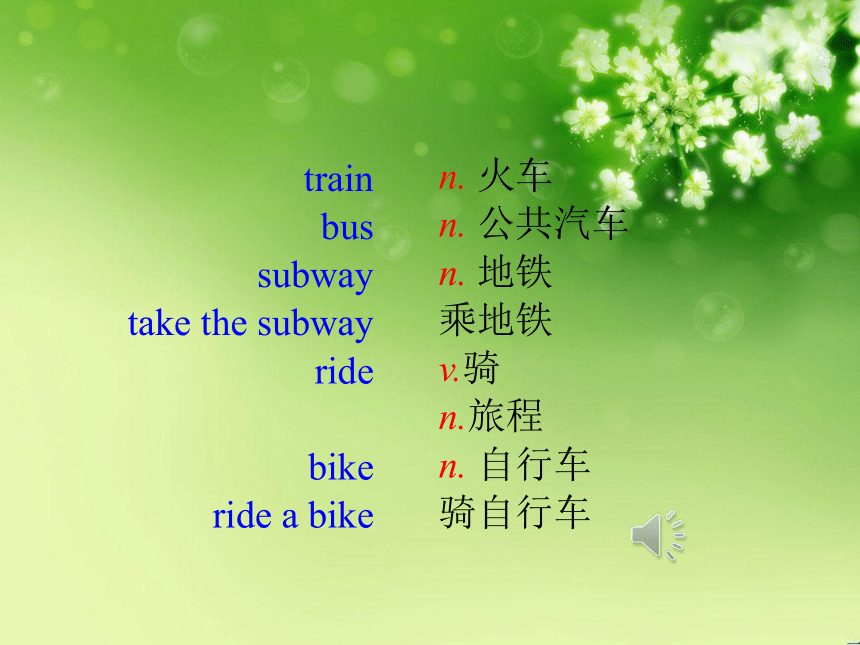
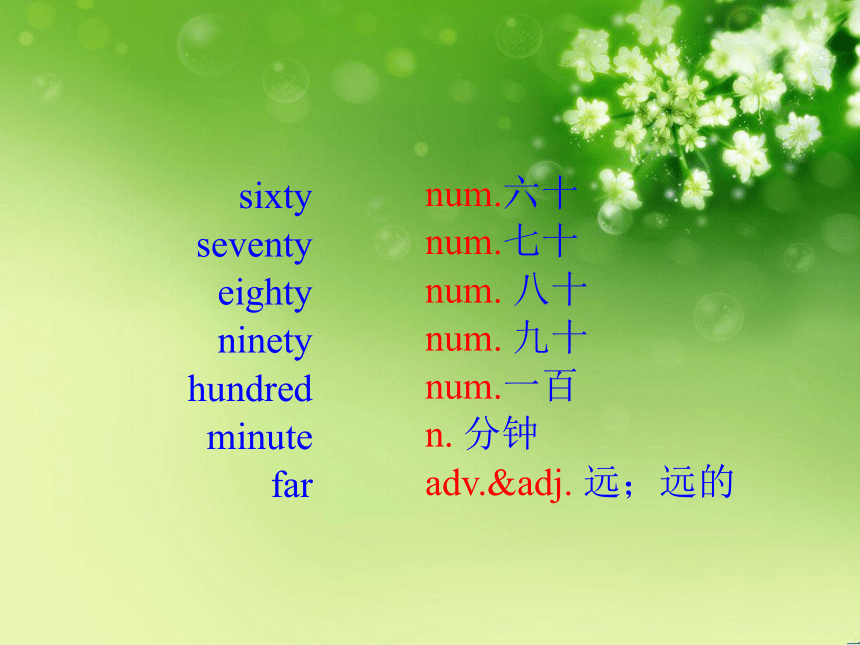
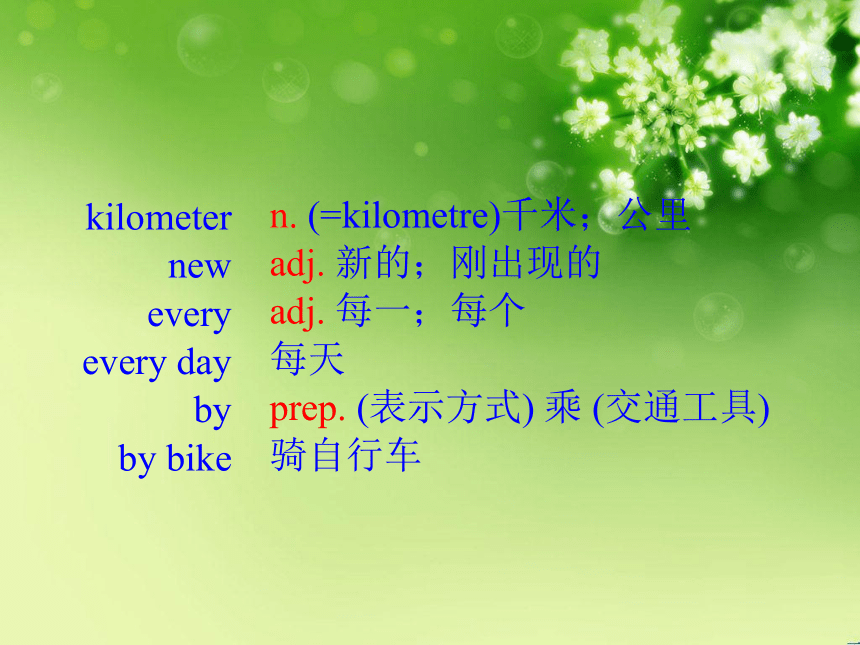
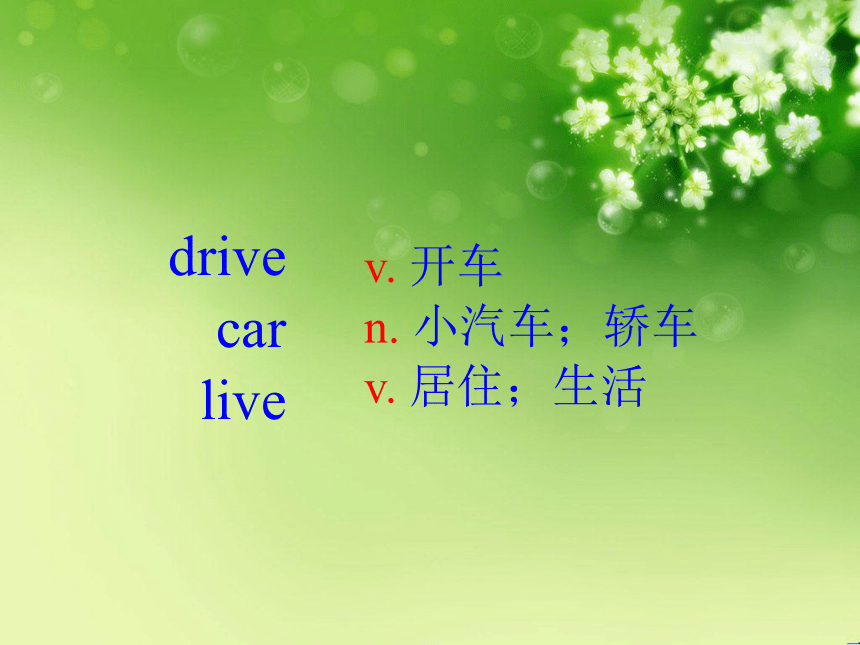
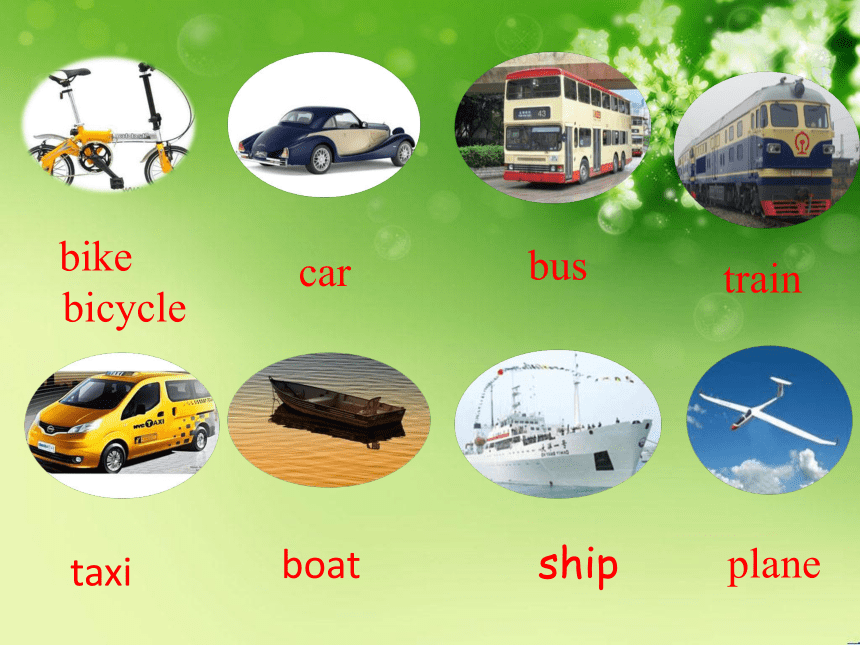
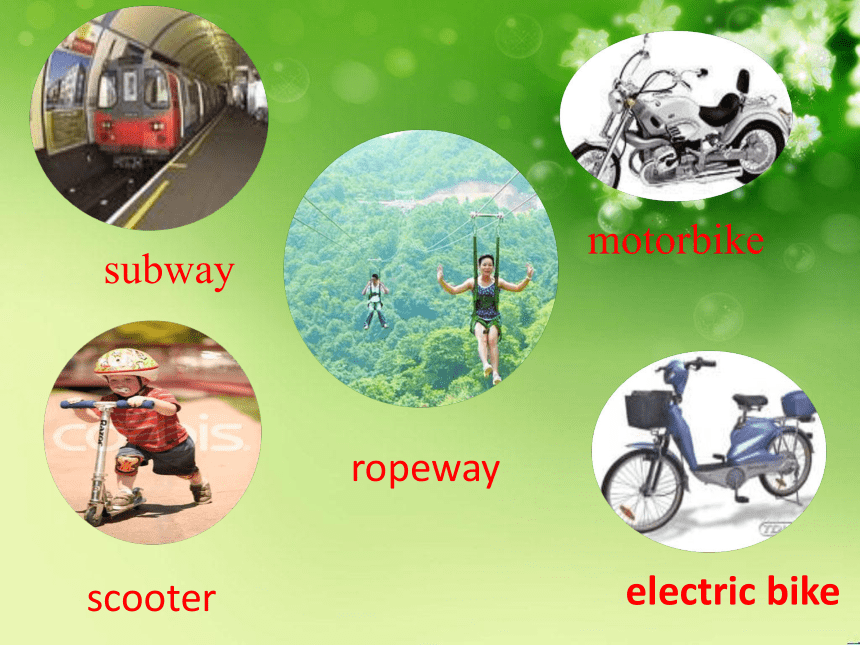
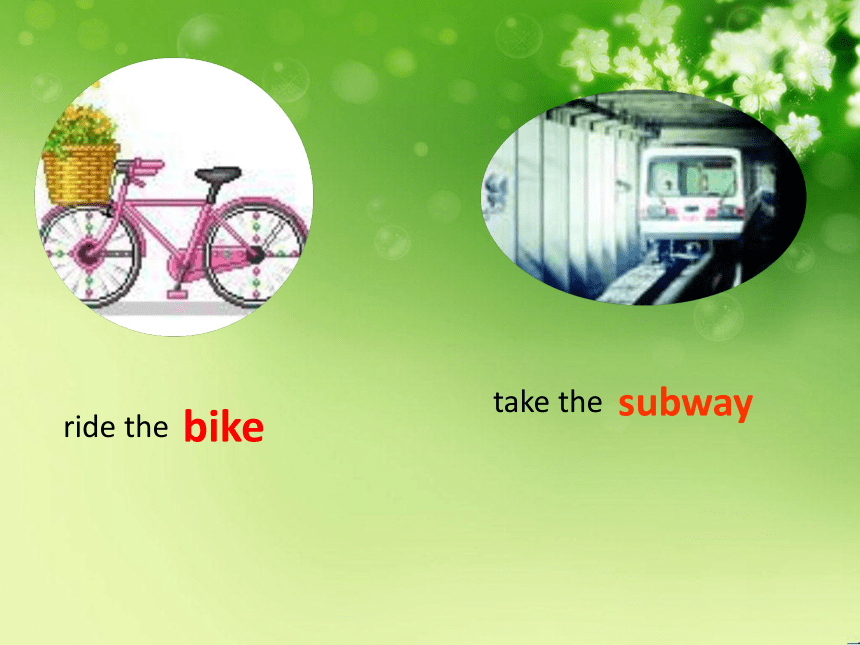
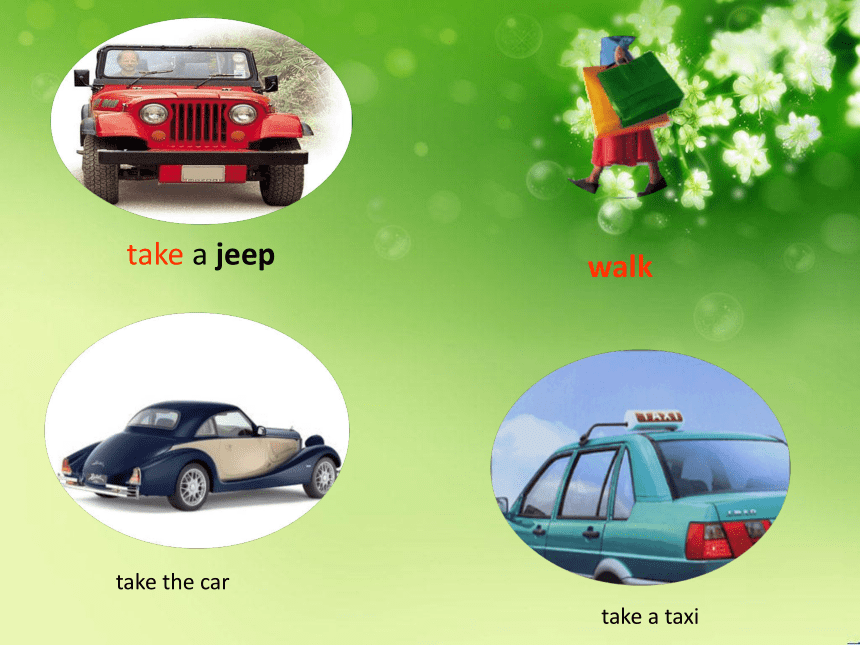

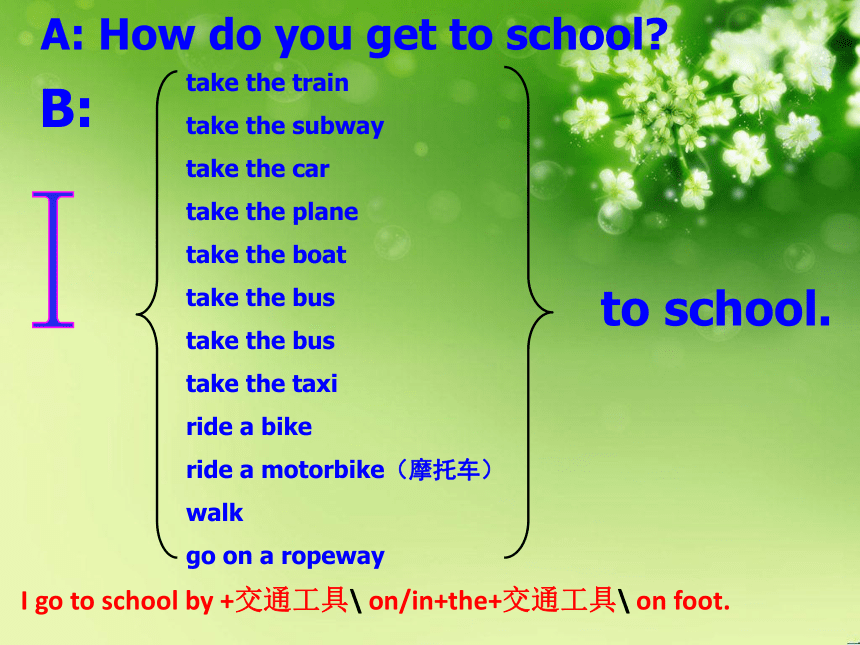

文档简介
(共79张PPT)
Unit 3
How do you get to school ?
Section A Period One
train
bus
subway
take the subway
ride
bike
ride a bike
n. 火车
n. 公共汽车
n. 地铁
乘地铁
v.骑
n.旅程
n. 自行车
骑自行车
sixty
seventy
eighty
ninety
hundred
minute
far
num.六十
num.七十
num. 八十
num. 九十
num.一百
n. 分钟
adv.&adj. 远;远的
kilometer
new
every
every day
by
by bike
n. (=kilometre)千米;公里
adj. 新的;刚出现的
adj. 每一;每个
每天
prep. (表示方式) 乘 (交通工具)
骑自行车
drive
car
live
v. 开车
n. 小汽车;轿车
v. 居住;生活
bike
bicycle
car
bus
train
plane
taxi
boat
ship
motorbike
subway
scooter
electric bike
ropeway
subway
take the
bike
ride the
walk
take a jeep
take the car
take a taxi
take the ship
take the train
take the plane
go on a ropeway
A: How do you get to school
take the train
take the subway
take the car
take the plane
take the boat
take the bus
take the bus
take the taxi
ride a bike
ride a motorbike(摩托车)
walk
go on a ropeway
B:
to school.
I go to school by +交通工具\ on/in+the+交通工具\ on foot.
He rides the bike to school.
How does he get to school
He walks to school.
How does she go to work
She takes the train to work.
How does she go to work
She takes the taxi to work.
She takes the ship to work.
How does he go to work
He takes the subway to work.
subway
How does he get to work
= Jackie Chan gets to work by bike every day.
Jackie Chan rides a bike to work every day.
学习用两种方式来表达:
Liu Yifei often takes a car to work.
=Liu Yifei often gets to work by car.
car
How does she get to work
Ni Ping often takes the bus to work.
= Ni Ping often gets to work by bus.
bus
Ni Ping
How does he get to work
Jay sometimes takes the train to work.
= Jay sometimes gets to work by train.
Jay
train
How does he get to work
Liu Xiang usually takes the subway to work.
= Liu Xiang usually gets to work by subway.
Liu Xiang
How does he get to work
= Zhou Bichang usually gets to school
on foot.
Zhou Bichang usually walks to school.
walk
Zhou Bichang
How does he get to work
A: How do you get to…
B: I take/ride …
I get to school by …
Pairwork
你学会了吗?
ride a bike by bike 骑自行车
walks on foot走路、步行
take the subway by subway 乘坐地铁
take the train by train 乘坐火车
take a car by car 乘坐小车
take the plane by plane 乘坐飞机
take the bus by bus 乘坐公车
take a boat by boat 乘坐船
Match the words with the pictures.
1a
take the train ___ 2. take the bus ___
3. take the subway ___ 4. ride a bike ___
5. walk ____
d
e
a
b
c
Bob 2. Mary 3. John 4. Paul 5. Yang Lan 6. Jim
Listen and write the numbers next to the correct students in the picture.
1b
2
3
4
6
5
1c
Look at the picture in 1a. How do the students get to school
Make conversations with your partner.
A: How does Mary get to school
B: She takes the subway.
thirty-two forty forty-one fifty sixty
32 40 41 50 60
forty-six fifty-eight sixty-one
46 58 61
你会说出这些数字吗?
2a
Listen and repeat. Then write the correct number
next to the word.
sixty-one ____
ninety-nine ___
seventy-two ___
one hundred and five ___
eighty-four ___
two hundred ___
72
99
105
200
61
84
84 105 99 200 72 61
2b
Listen and complete the chart.
How How long (minutes) How far (kilometers)
Tom
Jane
2c
Listen again. Check your answers in 2b.
2
20
1 hour 30 minutes
60
walk
take the bus
5 kilometers(公里)
---How far is it from your home to school
---(It’s) about 5 kilometers.
20 minutes
---It takes me 20 minutes
---How long does it take to get from home to school by bike
to go to school by bike.
10 minutes
25 minutes
8 minutes
How long does it take you to school It takes me 10 minutes to get to school by bus.
It takes her about 40 minutes to go to school by bike.
It takes her about 15minutes to go to school by car.
2:10----2:50 / 40 minutes
2:10----2:25 / 15 minutes
A: How do you get to school
B: Well, I usually _________but
sometimes I___________.
A: How far is it from your home
to school
B: About____________.
A: How long does it take
B: It takes __________by bus and
__________by subway.
Home to school:
10 kilometers
take a bus
10 minutes
take the subway
5minutes
take a bus
take the subway
10 kilometers
10 minutes
5 minutes
2d
Student A is Jane and Student B is Tom. Use the information in 2b to make conversations.
A: How do you get to school
B: I …
A: How long does it take …
B: It takes …
A: How far is it from … to …
B: It’s about …
Pairwork
Make a conversation about how you get to school.
A: How do you get to school
B: Well, I usually walk but sometimes I take the bus.
A: How long does it take
B: It takes about 25 minutes to walk and 10 minutes by bus.
2e
Role-play the conversation.
2e
Role-play the conversation.
Lisa: Hey, Jane. Is this your new bike
Jane: Yes. I ride it to school every day.
How do you get to school
Lisa: I usually take the bus.
Jane: How far is it from your home to
school
Lisa: I’m not sure… about 10 kilometers
The bus ride takes about 20 minutes.
How long does it take you to get to
school
Jane: About 15 minutes by bike. It’s good
exercise.
Lisa: Yeah. Well, have a good day at
school.
Jane: You, too.
关于 how 的用法
how adv. 指范围、程度、数量、价值等的“多少、多么”。
用于疑问句中,表示身体怎样。
How is your brother
你哥哥身体好吗?
2) 用于疑问句中,表示多少、什么程度。
How old is he
他多大年纪?
How much baggage am I allowed to take
我可以带多少行李?
I don’t know how far to rely on him.
我不知道应该依靠他到什么程度。
How far is it from your home to school
你家离学校有多远?
How is the U.S. dollar today
今天美元市价多少?
How long does it take you to get from home to school
你从家到学校要多久?
3)(指方式、方法)怎样,怎么 How did you climb to the top of that building 你是如何爬上楼顶的
How do you get to school
你是如何去学校的?
4) 用于惊叹句中,表示多么、何等。
How well you look!
你看起来多么健康啊!
How I wish to have a long vacation these days! 这些天我多么希望去度一次长假啊!
1. I’m not sure.
我不很肯定。(我不大有把握。)
这是一句表现自己对判断没有十足把握时的固定套语,可以模仿使用。其中的形容词sure表示“肯定的;确定的”,它的疑问形式和肯定形式在口语中也十分常用:
Are you sure 你确定吗?
I’m (quite) sure. 我(十分)肯定。
2. –How long does it take you to get to
school 你到学校要用多少时间?
-- About 15 minutes by bike.
骑自行车大约15分钟。
1) It takes+人+时间+to do…(事情)是一个十分常用的句型,其中动词take表示“花费(时间)”。如:
It takes me about half an hour to get to the airport.
我到机场大概需要半小时。
其中“时间”可用long(长久)、a short time(短时)等来表示。另外,“人”和“所做的事情”则可视具体的上下文进行省略。如:
It doesn’t take long to walk to school.
走着去学校花不了多长时间。
It’ll only take you a short time.
只花你一小会儿时间。
2) “by+交通工具”属固定介词短语,表示“乘坐、使用某种交通工具”。如:
by bus 乘公交车
by train 坐火车
by bike 骑自行车
by air 坐飞机
by boat 乘船
请注意,英语中on foot表示“步行;走路”,而不是by foot或on feet.
How do you get to school
I ride my bike.
How does she get to school
She usually takes the bus.
How long does it take to get to school
It takes about 15 minutes.
How far is it from your home to school
It’s only about two kilometers.
Grammar
Focus
Does Jane walk to school
No, she doesn’t. She goes by bike.
Do they take the bus to school
No, they don’t. They walk.
Grammar
Focus
1. ride a bike = by bike 骑自行车
2. take the subway = by subway 乘坐地铁
3. take the train = by train 乘坐火车
4. take a car = by car 乘坐小车
5. take a plane = by plane 乘坐飞机
6. take the bus = by bus 乘坐公车
7. take a boat = by boat 乘坐船
8. walks = on foot 走路、步行
9. get to 到达
10. It takes sb. some time to do sth.
花某人多长时间做某事
Translate and write them down.
- 你怎么去学校呢?
- 我经常步行,但有时候坐公共汽车。
- 要用多长时间呢?
- 步行大约25分钟,坐公共汽车十分钟。
How do you get to school
I usually walk but sometimes I take a bus.
How long does it take
It takes about 25 minutes to walk and 10 minutes by bus.
1. -- 通常你怎样去上学。
-- 我通常骑车去上学。
-- _____ ___ you usually go to school
-- I usually go to school _____ ______.
2. 地铁站离汽车站大约有300米远。
The subway station is _______ 300
_______ _____ ______ the bus stop.
3. 他通常每天用一小时做作业。
It usually ______ _____ half an hour
_____ _____ his homework every day.
takes him
How do
by bike
meters away from
about
to do
1. Listen to the tape
2. Make conversations about how your parents get to work. Write them down.
Homework
Section A
Period Two
How does she get to school
How do they get to Beijing
How do they get to the park
20 minutes
2 hours
12 minutes
How long does it take you to school It takes me 10 minutes to get to school by bus.
Free Talk
How do you get to school
How long does it take
How far is it from your home to school
3a
Match the questions with the answers. Then practice them.
How does Mike get to school
2. How long does it take to get home
3. How far is it from here
4. Do your friends go to school by bus
5. Does your dad drive his car to work
a. Yes, they do.
b. No, he doesn’t.
c. He rides his bike.
d. It’s five kilometers.
e. About 15 minutes.
c
e
d
a
b
Use these words to make questions. Then answer them.
3b
school/you/get to/do/how
2. to/school/get to/does/how long/take/it
3. school/your/from/it/is/how far/home/to
How do you get to school
How long does it take to get to school
How far is it from your home to school
I/we go to school by bus/train…
It takes an hour/30 minutes/half an hour to get to school.
It’s 30 kilometers/20 meters…
4. you/to/walk/do/school
5. ride/their bikes/do/school/your friends/to
Do your friends ride their bikes to school
Yes, they do./No, they don’t. They go to school by subway/bus…/They take the subway/train… to school.
Do you walk to school
Yes, I do./No, I don’t. I go to school by bus/train…
Task
3c
Ask your classmates questions and write their names in the chart. The first student to fill in all the blanks wins!
to carry
to consider
to remove
to eat
to write down
to buy
by
to accept
take
认识take
携带
乘坐
接受
移开
买下
写下
吃
考虑
1. to carry; to lead 携带,拿走,取走
Don’t forget to take your bag when you go.
你走的时候别忘了带上书包。
2. to accept; to receive 接受;收到
I take your point, but I still don’t think
you should have gone.
我接受你的观点, 可我还是觉得你不应
该去。
3. to use as transport 乘、坐(某一交通工具)
Mr. Smith often takes a train to work.
史密斯先生经常乘火车上班。
4. to choose; to buy; to rent 选中, 买下, 租用
That’s cheap. I’ll take it.
那很便宜,我买下了。
5. to get sth. 得到, 获得
He took a seat near a window.
他靠窗户坐下。
6. to write down 写下
You should take notes during the lecture.
在课堂上,你应该记笔记。
7. to eat; to drink 吃(饭), 喝(水), 服(药)
Take this medicine every four hours and
stay in bed for two days.
每隔四小时服用这些药,卧床休息两天。
8. to need or require a particular amount
of time 花费时间;需要(多长)时间
It takes him an hour to do his homework
in the evening.
晚上他要花一小时做作业。
9. to remove 移开
Here’s your pen, I took it by mistake.
这是你的钢笔,我拿错了。
take off 起飞
I’m afraid I have to go now. The plane
will take off soon.
我恐怕现在要走了。飞机快要起飞了。
10. to say that sb. is doing sth., performing an action, etc. (和名词连用)表举动、动作等
take a glance (or look) at 看一 眼(强调动作)
May I take a look at your new pen
我能看看你的新钢笔吗?
take a walk 散步
Taking a walk is good for you.
散步对你有好处。
11. to have a particular state 出现(状况)
take advantage of 利用
Otherwise, you will take no advantage of
opportunities when they come to visit you. 否则,机遇来临你却无法利用。
12. to consider 考虑
We’re taking the bomb threats very seriously.
我们认为这次的炸弹恐吓事件非常严重。
take…into consideration 考虑到, 把 …考虑进去
You should take the weather into consideration.
你应该把天气考虑在内。
13. to get possession or control of sth. 拥有, 控制
The king’s army easily took the enemy fortress.
国王的军队轻而易举地控制了敌人的城堡。
take charge of 负责管理(照顾)
John will take charge of the next meeting.
约翰将主持下一次会议。
活学活用
从上面给出的例句中我们可以看到 take的丰富含义。英语中很多词非常活跃, 大家注意活学活用,理解时多注意上下文,勤查字典。
Translate and write them down.
1. 林飞家离学校大约10千米。
2. - 从你家到学校有多远?
- 3英里。
Lin Fei’s home is about 10 kilometers from school.
How far is it from your home to school
It’s three miles.
3. 你家离学校有多远?
_____ ____ is it ______ your home ___ school
4. 在中国,自行车和公共汽车是最流行的
交通方式。
In China, bikes and buses _____ the
______popular ____________ of
________________.
most ways/means
transportation
How far from to
are
A: _______________________
B: I usually ride my bike.
A: _______is it from your home to school
B: About 10 kilometers.
A: _____does it take
B: It ___me around 35 minutes.
Try to fill in the blanks.
How do you get to school
How far
How long
takes
Homework
Write about how your best friends get to school.
Unit 3
How do you get to school ?
Section A Period One
train
bus
subway
take the subway
ride
bike
ride a bike
n. 火车
n. 公共汽车
n. 地铁
乘地铁
v.骑
n.旅程
n. 自行车
骑自行车
sixty
seventy
eighty
ninety
hundred
minute
far
num.六十
num.七十
num. 八十
num. 九十
num.一百
n. 分钟
adv.&adj. 远;远的
kilometer
new
every
every day
by
by bike
n. (=kilometre)千米;公里
adj. 新的;刚出现的
adj. 每一;每个
每天
prep. (表示方式) 乘 (交通工具)
骑自行车
drive
car
live
v. 开车
n. 小汽车;轿车
v. 居住;生活
bike
bicycle
car
bus
train
plane
taxi
boat
ship
motorbike
subway
scooter
electric bike
ropeway
subway
take the
bike
ride the
walk
take a jeep
take the car
take a taxi
take the ship
take the train
take the plane
go on a ropeway
A: How do you get to school
take the train
take the subway
take the car
take the plane
take the boat
take the bus
take the bus
take the taxi
ride a bike
ride a motorbike(摩托车)
walk
go on a ropeway
B:
to school.
I go to school by +交通工具\ on/in+the+交通工具\ on foot.
He rides the bike to school.
How does he get to school
He walks to school.
How does she go to work
She takes the train to work.
How does she go to work
She takes the taxi to work.
She takes the ship to work.
How does he go to work
He takes the subway to work.
subway
How does he get to work
= Jackie Chan gets to work by bike every day.
Jackie Chan rides a bike to work every day.
学习用两种方式来表达:
Liu Yifei often takes a car to work.
=Liu Yifei often gets to work by car.
car
How does she get to work
Ni Ping often takes the bus to work.
= Ni Ping often gets to work by bus.
bus
Ni Ping
How does he get to work
Jay sometimes takes the train to work.
= Jay sometimes gets to work by train.
Jay
train
How does he get to work
Liu Xiang usually takes the subway to work.
= Liu Xiang usually gets to work by subway.
Liu Xiang
How does he get to work
= Zhou Bichang usually gets to school
on foot.
Zhou Bichang usually walks to school.
walk
Zhou Bichang
How does he get to work
A: How do you get to…
B: I take/ride …
I get to school by …
Pairwork
你学会了吗?
ride a bike by bike 骑自行车
walks on foot走路、步行
take the subway by subway 乘坐地铁
take the train by train 乘坐火车
take a car by car 乘坐小车
take the plane by plane 乘坐飞机
take the bus by bus 乘坐公车
take a boat by boat 乘坐船
Match the words with the pictures.
1a
take the train ___ 2. take the bus ___
3. take the subway ___ 4. ride a bike ___
5. walk ____
d
e
a
b
c
Bob 2. Mary 3. John 4. Paul 5. Yang Lan 6. Jim
Listen and write the numbers next to the correct students in the picture.
1b
2
3
4
6
5
1c
Look at the picture in 1a. How do the students get to school
Make conversations with your partner.
A: How does Mary get to school
B: She takes the subway.
thirty-two forty forty-one fifty sixty
32 40 41 50 60
forty-six fifty-eight sixty-one
46 58 61
你会说出这些数字吗?
2a
Listen and repeat. Then write the correct number
next to the word.
sixty-one ____
ninety-nine ___
seventy-two ___
one hundred and five ___
eighty-four ___
two hundred ___
72
99
105
200
61
84
84 105 99 200 72 61
2b
Listen and complete the chart.
How How long (minutes) How far (kilometers)
Tom
Jane
2c
Listen again. Check your answers in 2b.
2
20
1 hour 30 minutes
60
walk
take the bus
5 kilometers(公里)
---How far is it from your home to school
---(It’s) about 5 kilometers.
20 minutes
---It takes me 20 minutes
---How long does it take to get from home to school by bike
to go to school by bike.
10 minutes
25 minutes
8 minutes
How long does it take you to school It takes me 10 minutes to get to school by bus.
It takes her about 40 minutes to go to school by bike.
It takes her about 15minutes to go to school by car.
2:10----2:50 / 40 minutes
2:10----2:25 / 15 minutes
A: How do you get to school
B: Well, I usually _________but
sometimes I___________.
A: How far is it from your home
to school
B: About____________.
A: How long does it take
B: It takes __________by bus and
__________by subway.
Home to school:
10 kilometers
take a bus
10 minutes
take the subway
5minutes
take a bus
take the subway
10 kilometers
10 minutes
5 minutes
2d
Student A is Jane and Student B is Tom. Use the information in 2b to make conversations.
A: How do you get to school
B: I …
A: How long does it take …
B: It takes …
A: How far is it from … to …
B: It’s about …
Pairwork
Make a conversation about how you get to school.
A: How do you get to school
B: Well, I usually walk but sometimes I take the bus.
A: How long does it take
B: It takes about 25 minutes to walk and 10 minutes by bus.
2e
Role-play the conversation.
2e
Role-play the conversation.
Lisa: Hey, Jane. Is this your new bike
Jane: Yes. I ride it to school every day.
How do you get to school
Lisa: I usually take the bus.
Jane: How far is it from your home to
school
Lisa: I’m not sure… about 10 kilometers
The bus ride takes about 20 minutes.
How long does it take you to get to
school
Jane: About 15 minutes by bike. It’s good
exercise.
Lisa: Yeah. Well, have a good day at
school.
Jane: You, too.
关于 how 的用法
how adv. 指范围、程度、数量、价值等的“多少、多么”。
用于疑问句中,表示身体怎样。
How is your brother
你哥哥身体好吗?
2) 用于疑问句中,表示多少、什么程度。
How old is he
他多大年纪?
How much baggage am I allowed to take
我可以带多少行李?
I don’t know how far to rely on him.
我不知道应该依靠他到什么程度。
How far is it from your home to school
你家离学校有多远?
How is the U.S. dollar today
今天美元市价多少?
How long does it take you to get from home to school
你从家到学校要多久?
3)(指方式、方法)怎样,怎么 How did you climb to the top of that building 你是如何爬上楼顶的
How do you get to school
你是如何去学校的?
4) 用于惊叹句中,表示多么、何等。
How well you look!
你看起来多么健康啊!
How I wish to have a long vacation these days! 这些天我多么希望去度一次长假啊!
1. I’m not sure.
我不很肯定。(我不大有把握。)
这是一句表现自己对判断没有十足把握时的固定套语,可以模仿使用。其中的形容词sure表示“肯定的;确定的”,它的疑问形式和肯定形式在口语中也十分常用:
Are you sure 你确定吗?
I’m (quite) sure. 我(十分)肯定。
2. –How long does it take you to get to
school 你到学校要用多少时间?
-- About 15 minutes by bike.
骑自行车大约15分钟。
1) It takes+人+时间+to do…(事情)是一个十分常用的句型,其中动词take表示“花费(时间)”。如:
It takes me about half an hour to get to the airport.
我到机场大概需要半小时。
其中“时间”可用long(长久)、a short time(短时)等来表示。另外,“人”和“所做的事情”则可视具体的上下文进行省略。如:
It doesn’t take long to walk to school.
走着去学校花不了多长时间。
It’ll only take you a short time.
只花你一小会儿时间。
2) “by+交通工具”属固定介词短语,表示“乘坐、使用某种交通工具”。如:
by bus 乘公交车
by train 坐火车
by bike 骑自行车
by air 坐飞机
by boat 乘船
请注意,英语中on foot表示“步行;走路”,而不是by foot或on feet.
How do you get to school
I ride my bike.
How does she get to school
She usually takes the bus.
How long does it take to get to school
It takes about 15 minutes.
How far is it from your home to school
It’s only about two kilometers.
Grammar
Focus
Does Jane walk to school
No, she doesn’t. She goes by bike.
Do they take the bus to school
No, they don’t. They walk.
Grammar
Focus
1. ride a bike = by bike 骑自行车
2. take the subway = by subway 乘坐地铁
3. take the train = by train 乘坐火车
4. take a car = by car 乘坐小车
5. take a plane = by plane 乘坐飞机
6. take the bus = by bus 乘坐公车
7. take a boat = by boat 乘坐船
8. walks = on foot 走路、步行
9. get to 到达
10. It takes sb. some time to do sth.
花某人多长时间做某事
Translate and write them down.
- 你怎么去学校呢?
- 我经常步行,但有时候坐公共汽车。
- 要用多长时间呢?
- 步行大约25分钟,坐公共汽车十分钟。
How do you get to school
I usually walk but sometimes I take a bus.
How long does it take
It takes about 25 minutes to walk and 10 minutes by bus.
1. -- 通常你怎样去上学。
-- 我通常骑车去上学。
-- _____ ___ you usually go to school
-- I usually go to school _____ ______.
2. 地铁站离汽车站大约有300米远。
The subway station is _______ 300
_______ _____ ______ the bus stop.
3. 他通常每天用一小时做作业。
It usually ______ _____ half an hour
_____ _____ his homework every day.
takes him
How do
by bike
meters away from
about
to do
1. Listen to the tape
2. Make conversations about how your parents get to work. Write them down.
Homework
Section A
Period Two
How does she get to school
How do they get to Beijing
How do they get to the park
20 minutes
2 hours
12 minutes
How long does it take you to school It takes me 10 minutes to get to school by bus.
Free Talk
How do you get to school
How long does it take
How far is it from your home to school
3a
Match the questions with the answers. Then practice them.
How does Mike get to school
2. How long does it take to get home
3. How far is it from here
4. Do your friends go to school by bus
5. Does your dad drive his car to work
a. Yes, they do.
b. No, he doesn’t.
c. He rides his bike.
d. It’s five kilometers.
e. About 15 minutes.
c
e
d
a
b
Use these words to make questions. Then answer them.
3b
school/you/get to/do/how
2. to/school/get to/does/how long/take/it
3. school/your/from/it/is/how far/home/to
How do you get to school
How long does it take to get to school
How far is it from your home to school
I/we go to school by bus/train…
It takes an hour/30 minutes/half an hour to get to school.
It’s 30 kilometers/20 meters…
4. you/to/walk/do/school
5. ride/their bikes/do/school/your friends/to
Do your friends ride their bikes to school
Yes, they do./No, they don’t. They go to school by subway/bus…/They take the subway/train… to school.
Do you walk to school
Yes, I do./No, I don’t. I go to school by bus/train…
Task
3c
Ask your classmates questions and write their names in the chart. The first student to fill in all the blanks wins!
to carry
to consider
to remove
to eat
to write down
to buy
by
to accept
take
认识take
携带
乘坐
接受
移开
买下
写下
吃
考虑
1. to carry; to lead 携带,拿走,取走
Don’t forget to take your bag when you go.
你走的时候别忘了带上书包。
2. to accept; to receive 接受;收到
I take your point, but I still don’t think
you should have gone.
我接受你的观点, 可我还是觉得你不应
该去。
3. to use as transport 乘、坐(某一交通工具)
Mr. Smith often takes a train to work.
史密斯先生经常乘火车上班。
4. to choose; to buy; to rent 选中, 买下, 租用
That’s cheap. I’ll take it.
那很便宜,我买下了。
5. to get sth. 得到, 获得
He took a seat near a window.
他靠窗户坐下。
6. to write down 写下
You should take notes during the lecture.
在课堂上,你应该记笔记。
7. to eat; to drink 吃(饭), 喝(水), 服(药)
Take this medicine every four hours and
stay in bed for two days.
每隔四小时服用这些药,卧床休息两天。
8. to need or require a particular amount
of time 花费时间;需要(多长)时间
It takes him an hour to do his homework
in the evening.
晚上他要花一小时做作业。
9. to remove 移开
Here’s your pen, I took it by mistake.
这是你的钢笔,我拿错了。
take off 起飞
I’m afraid I have to go now. The plane
will take off soon.
我恐怕现在要走了。飞机快要起飞了。
10. to say that sb. is doing sth., performing an action, etc. (和名词连用)表举动、动作等
take a glance (or look) at 看一 眼(强调动作)
May I take a look at your new pen
我能看看你的新钢笔吗?
take a walk 散步
Taking a walk is good for you.
散步对你有好处。
11. to have a particular state 出现(状况)
take advantage of 利用
Otherwise, you will take no advantage of
opportunities when they come to visit you. 否则,机遇来临你却无法利用。
12. to consider 考虑
We’re taking the bomb threats very seriously.
我们认为这次的炸弹恐吓事件非常严重。
take…into consideration 考虑到, 把 …考虑进去
You should take the weather into consideration.
你应该把天气考虑在内。
13. to get possession or control of sth. 拥有, 控制
The king’s army easily took the enemy fortress.
国王的军队轻而易举地控制了敌人的城堡。
take charge of 负责管理(照顾)
John will take charge of the next meeting.
约翰将主持下一次会议。
活学活用
从上面给出的例句中我们可以看到 take的丰富含义。英语中很多词非常活跃, 大家注意活学活用,理解时多注意上下文,勤查字典。
Translate and write them down.
1. 林飞家离学校大约10千米。
2. - 从你家到学校有多远?
- 3英里。
Lin Fei’s home is about 10 kilometers from school.
How far is it from your home to school
It’s three miles.
3. 你家离学校有多远?
_____ ____ is it ______ your home ___ school
4. 在中国,自行车和公共汽车是最流行的
交通方式。
In China, bikes and buses _____ the
______popular ____________ of
________________.
most ways/means
transportation
How far from to
are
A: _______________________
B: I usually ride my bike.
A: _______is it from your home to school
B: About 10 kilometers.
A: _____does it take
B: It ___me around 35 minutes.
Try to fill in the blanks.
How do you get to school
How far
How long
takes
Homework
Write about how your best friends get to school.
同课章节目录
- Unit 1 Can you play the guitar?
- Section A
- Section B
- Unit 2 What time do you go to school?
- Section A
- Section B
- Unit 3 How do you get to school?
- Section A
- Section B
- Unit 4 Don't eat in class.
- Section A
- Section B
- Unit 5 Why do you like pandas?
- Section A
- Section B
- Unit 6 I'm watching TV.
- Section A
- Section B
- Review of Units 1-6
- Unit 7 It's raining!
- Section A
- Section B
- Unit 8 Is there a post office near here?
- Section A
- Section B
- Unit 9 What does he look like?
- Section A
- Section B
- Unit 10 I'd like some noodles.
- Section A
- Section B
- Unit 11 How was your school trip?
- Section A
- Section B
- Unit 12 What did you do last weekend?
- Section A
- Section B
